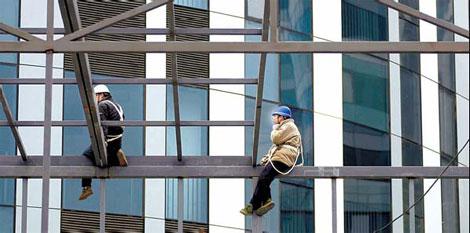
Two workers at a construction site in Beijing. Amid global uncertainty, the government may adopt more flexible measures on the property sector to ensure economic growth, economists said. [China Daily]
BEIJING: Policymakers are expected to adopt a more prudent stance towards tightening policies and opt for a balanced approach to tackle rising consumer and asset prices in the nation, amid the unclear global economic scenario caused by the sovereign debt crisis in Europe.
Though some investment banks have lowered China's 2010 economic growth projections, many economists feel that the credentials for a robust growth are still intact in the nation.
"The massive rescue package for Greece will help the market regain confidence and increase liquidity. At the same time it may also produce more bubbles as there are chances that the funds may be misused," said Yi Xianrong, an economist at the financial research center of the Chinese Academy of Social Sciences.
With European nations like Portugal, Spain and Ireland also facing debt traps, there is a shadow over global economic recovery. Policymakers in China may also find it hard to increase the tightening measures, said Hu Shaowei, an economist with the State Information Center.
Investment bank China International Capital Corporation Ltd lowered its economic growth prediction for China's economy by 1 percentage point to 9.5 percent after taking into account the global economy risks and the government's new measures for the real estate sector.
Full coverage: China Biz & Economic Statistics
China Biz & Economic StatisticsChina's macroeconomic measures should be more flexible to avoid any big increase or decline in the overall growth rate, it said in a report.
Revaluation of the yuan against the dollar and the readjustment of interest rates could be postponed, and property measures should be fine-tuned so that they are more flexible to ensure the economic growth would not be seriously affected, the bank said.
Tuesday's data showed China's consumer price index (CPI) picking up at a faster pace in April and rose by 2.8 percent year on year, partly due to the unusual weather and the low base figure of the same period last year, economists said.
"It won't result in an immediate interest rate hike," said Zhang Xiaojing, senior economist at the Chinese Academy of Social Sciences. "Personally I think the inflation pressure is not too high if the CPI is kept under 4 percent." The government has set a target of 3 percent for CPI growth this year.
"An interest rate hike is unlikely this month," said Hu of the State Information Center.
Most research institutions have forecast that interest rate hikes could materialize in June. But given the external shocks produced by the European debt crisis, analysts said it could be delayed as the Chinese policymakers become more cautious.
Moreover, a slew of tightening measures launched by the government recently, which are taking effect, have eased the pressure for an increase in interest rates, said economists.
Policymakers seem to be waiting and judging how the tightening measures on the real estate sector will play out and the government could adopt flexible measures if realty prices fell too sharply, Zhang said.





